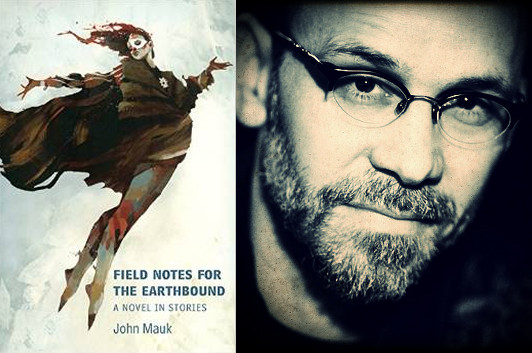John Mauk: The Urgency of Lee K. Abbott

photo: JohnMauk.com
The stories in John Mauk‘s Field Notes for the Earthbound are situated into an uncanny niche between realism and fantasy—a world where magic is folded into the ebb and flow of everyday life… until it bursts through to the surface. But not everything that’s weird in John Mauk’s corner of Ohio is supernatural, and those parts of the stories have an unsettling power as well. In this essay, Mauk discusses another short story writer whose voice compels him with each reading…
If I get waylaid or traffic jammed, I want something to study, something dense and alluring. So I carry a book nearly everywhere I go. For several months, that book has been All Things, All at Once, a panoramic collection of new and selected stories by Lee K. Abbott. All Things has been shoved in my backpack and crammed in various bags. It has slithered between couch cushions and ridden along like a family dog in the backseat of my Honda. My past ride-alongs include Close Range (Annie Proulx), Seven Nights (Jorges Luis Borges), One Hundred Years of Solitude (Gabriel Garcia Marquez), Cloud Street (Tim Winton), The Postmodern Explained (Jean Lyotard), and Negotiations (Gilles Deleuze), books that reshape the neurological and emotional landscape, that are worthy of a million reads. Abbott’s collection is that worthy. It’s full of stories that go hard and characters that yearn like crazy.
When it comes to fiction, I want to be tossed around, lulled, and then awakened by a bucket of something, anything. I want the most lush experience possible. I want a narrator to undo my thinking, to pull my teeth out. I want to go all gummy into the next sentence or page. Don’t get me wrong: I don’t want hijinks. I’m not a fan of narrative trickery. What I’m after is a narrator that sizzles or shimmers in some weird way—a voice that walks up to the line of propriety, looks both ways, and then steps over it.
And here’s the thing about Abbott’s narrators: they feel urgent—as though they’ve been lost in the desert for months, as if they’ve just wandered into town with nothing but clarity. They sound wild-eyed and prophetic, rambling in some beautiful desert tongue. They have so much stuff to report, and it’s all crucial. Every speck, recollection, and fussy qualifier matters. Consider this passage from “Revolutionaries,” in which the narrator recalls how an old friend went politically rogue:
“Toward the end—before the campus cops and four state policemen broke it up by dragging Jimmy off—he delivered a rambling singsongy declaration that mentioned Abe Maslow, Aldous Huxley, Carol Rogers, D.T. Suzuki—names that passed over me like clouds. They were the dead or the living, or the never-were. I wanted him to talk—if that’s all this was—about being afraid, about what dead William Wordsworth’s verses skills had to do with anything, and about what I was supposed to be doing in five or ten years. But he went on—“We’re discussing human worth here!”—his hair flyaway, his T-shirt too small and covered with buttons, his cheeks painted like an Apache’s, ignoring the hecklers who said he was queer, or chickenshit, or a commie.”
29 November 2014 | selling shorts |
PoetryFest at the Irish Arts Center

click photo for full-size version
New York’s Irish Arts Center hosts a wide variety of literary events, with writers like Eimear McBride, Mary Gordon, Paul Muldoon, Kevin Barry, Mary Higgins Clark, Pete Hamill, and Meghan O’Rourke (among many others); they’ve also been known to give away thousands of books by Irish and Irish-American writers across the city to celebrate St. Patrick’s Day. The IAC recently celebrated its sixth annual PoetryFest, and Louise Crawford, the curator of the Brooklyn Reading Works series at The Old Stone House in Park Slope, was on hand for the opening night festivities. She sent this report, along with several photos by Amanda Gentile.
Perhaps the best way to get to know a poet, aside from reading their poetry, is to hear them recite their favorite poem. That is precisely what happened on the opening night of PoetryFest, Irish Arts Center’s 6th annual 3-day celebration of poetry from both sides of the Atlantic, on a recent Friday night in November in Manhattan. The evening was a veritable lesson in classic and contemporary Irish poetry.
Tara Bergin, this year’s winner of the Seamus Heaney Centre for Poetry Prize, opened the reading with “Donal Og” (Young Donald), an Irish ballad possibly from the 8th century and translated by Lady Augusta Gregory. Miriam Gamble, the winner of the Eric Gregory award and a 2011 Somerset Maugham Award, read “Dancers at the Moy” by Paul Muldoon, expressing amazement that the poet was only 23 when he wrote this brilliant and sophisticated poem.
Adam Fitzgerald, author of the debut collection The Late Parade, explained that the copy of The Collected Poems of W.B. Yeats he held in his hand was the first book of poetry he’d ever read cover to cover. “Attempting to read ‘Adam’s Curse’ by Yeats is like doing a cover of a Beatles songs at a rock concert,†he told the crowd. Comedian Maeve Higgins lit the stage with her radiant smile and sly wit. She apologized for selecting an example of Gaelic spirituality by best selling author John O’Donohue but proceeded to read “Beannacht / Blessing†with great power.
26 November 2014 | events |

 Our Endless and Proper Work is my new book with Belt Publishing about starting (and sticking to) a productive writing practice.
Our Endless and Proper Work is my new book with Belt Publishing about starting (and sticking to) a productive writing practice. 
